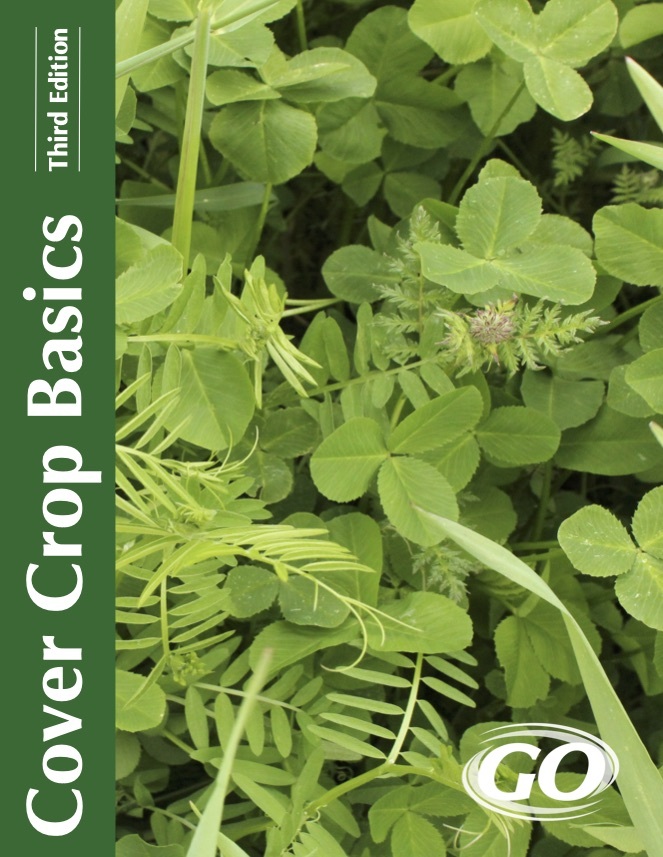Cereal Rye Cover Crop for Reducing Herbicides in Soybeans, 2019
Based on previous on-farm research he has conducted,[1] Sam Bennett has seen evidence that a cereal rye cover crop can suppress weeds and reduce herbicide inputs in soybeans. As such,
Based on previous on-farm research he has conducted,[1] Sam Bennett has seen evidence that a cereal rye cover crop can suppress weeds and reduce herbicide inputs in soybeans. As such,
While maximizing the benefits of cover crops requires extending their growing period, prolonging growth and delaying termination beyond the date of soybean emergence is not allowed under federal crop insurance
While maximizing the benefits of cover crops requires extending their growing period, prolonging growth and delaying termination beyond the date of soybean emergence is not allowed under federal crop insurance
While maximizing the benefits of cover crops requires extending their growing period, prolonging growth and delaying termination beyond the date of soybean emergence is not allowed under federal crop insurance
UNIVERSITY OF ILLINOIS LEGUME COVER CROP TRIAL EWING DEMONSTRATION CENTER 2015-16
Updated: 6/3/2021 Rick Clark, 5th generation farmer has been using cover crops for over 10 years on his 7,000 acre family farm. 1,200 of Clark Land and Cattle is certified
Trial conducted in Wisconsin examining the pros and cons of Red Clover, Cereal Rye and Radish
In dairy farming systems, growing winter crops for forage is frequently limited to annual grasses grown in monoculture. The objectives of this study were to determine how cropping grasses alone
Boosting and maintaining soil health can provide a multitude of benefits to the farming operation. Cover cropping is a strategy that can be used to improve soil health. Cover cropping
Boosting and maintaining soil health can provide a multitude of benefits to the farming operation. Cover cropping is a strategy that can be used to improve soil health. Cover cropping
Boosting and maintaining soil health can provide a multitude of benefits to the farming operation. Cover cropping is a strategy that can be used to improve soil health. Cover cropping
As cover cropping expands throughout Vermont, it is important to understand the potential benefits, consequences, and risks associated with growing cover crops in various cropping systems. In an effort to
As farmers in the northeast face ever-mounting pressure and desire to protect water quality, increase soil health, and maintain productive and sustainable farms, they are increasingly turning to cover crops
Cover crops have the potential to provide many soil health and crop production benefits, but their success depends upon selection and use of species and varieties adapted to the local
The Nebraska On-Farm Research Network approaches topics that are critical to farmer productivity, profitability, and sustainability. These topics include nutrient management, pest control, irrigation strategies, conservation programs, new technologies, soil
The Nebraska On-Farm Research Network approaches topics that are critical to farmer productivity, profitability, and sustainability. These topics include nutrient management, pest control, irrigation strategies, conservation programs, new technologies, soil
The Nebraska On-Farm Research Network approaches topics that are critical to farmer productivity, profitability, and sustainability. These topics include nutrient management, pest control, irrigation strategies, conservation programs, new technologies, soil
The Nebraska On-Farm Research Network approaches topics that are critical to farmer productivity, profitability, and sustainability. These topics include nutrient management, pest control, irrigation strategies, conservation programs, new technologies, soil
The Nebraska On-Farm Research Network approaches topics that are critical to farmer productivity, profitability, and sustainability. These topics include nutrient management, pest control, irrigation strategies, conservation programs, new technologies, soil
Cover crops provide a source of fertility and weed control, and there is increased interest in cover crops for use in organic crop production. A replicated field study was established
Have you received your free copy of the NEW Cover Crop Basics, 3rd Edition? Order for yourself, your neighbor, or your soil health event today!
